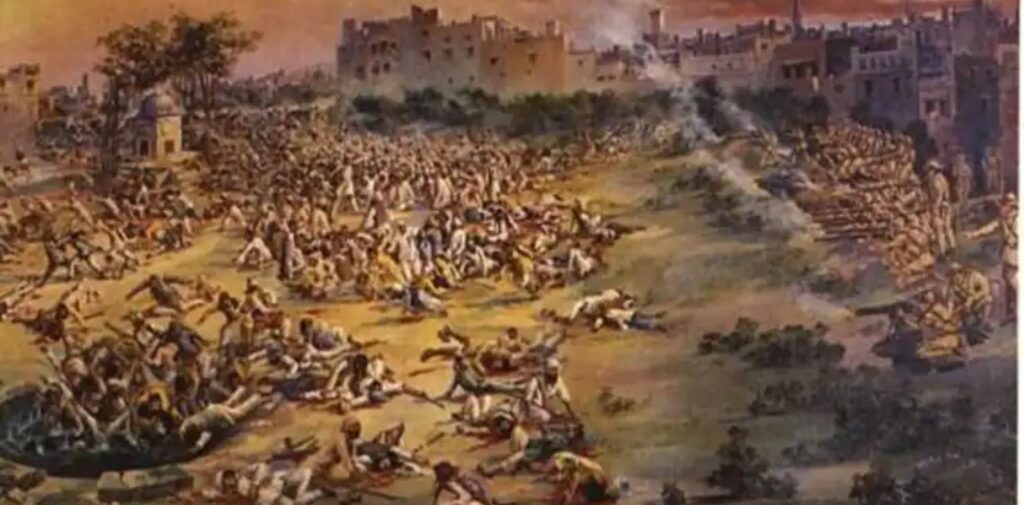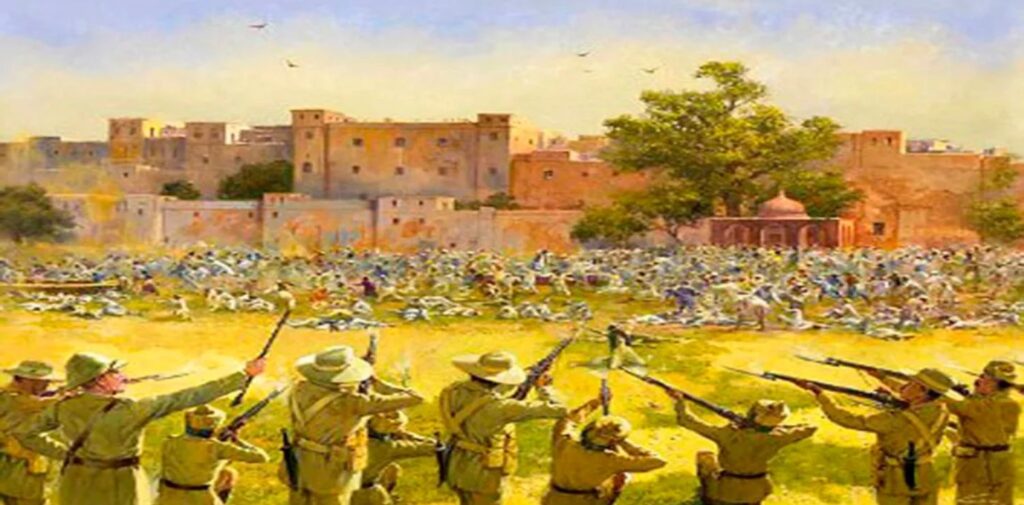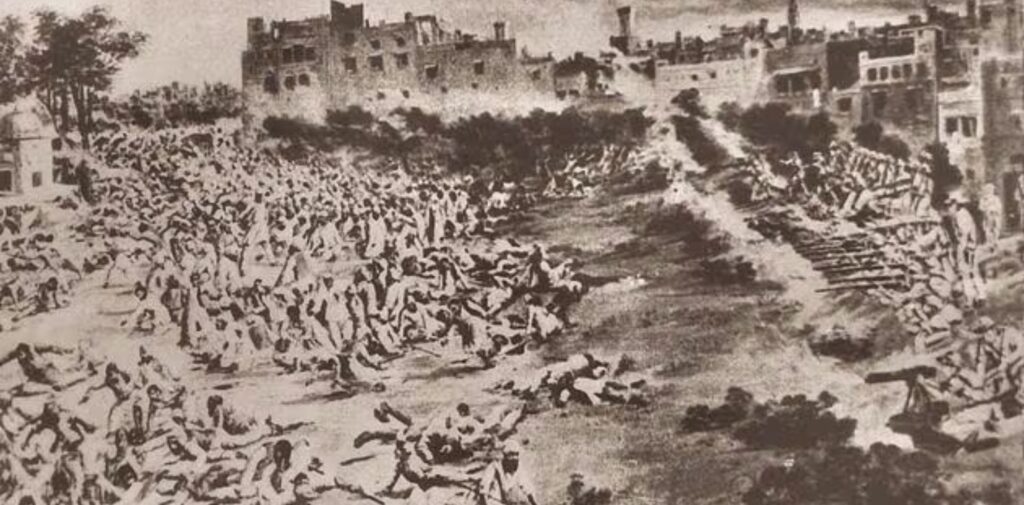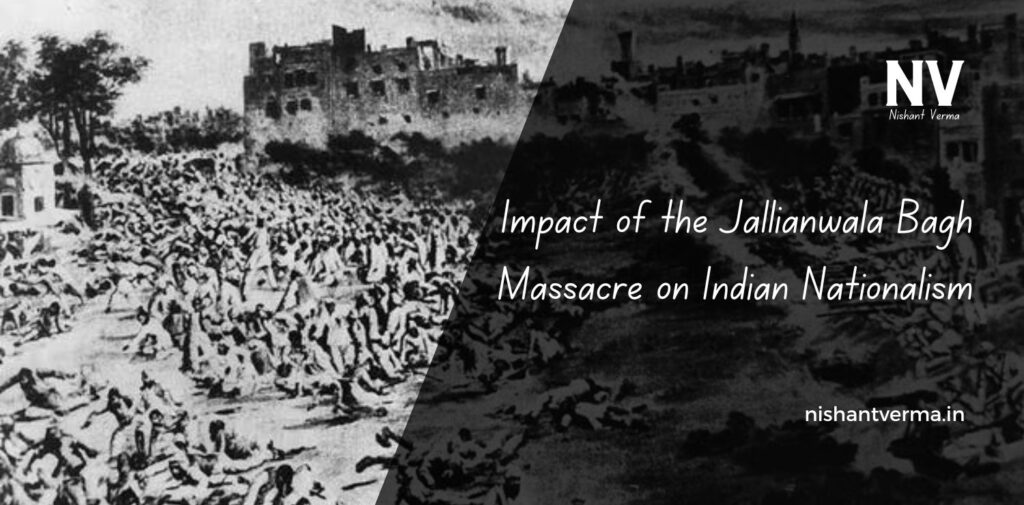The Jallianwala Bagh Massacre is one of the darkest chapters in the history of British rule in India. It was a turning point that made millions of Indians realize the cruelty of British rulers and pushed many to join the fight for India’s independence. In this article, we will understand what happened during the Jallianwala Bagh massacre, how it affected India, and how it changed the course of the Indian independence movement.
What Was the Jallianwala Bagh Massacre?
The Jallianwala Bagh Massacre took place on April 13, 1919, in Amritsar, a city in the state of Punjab. On this day, thousands of Indians had gathered in a large open space called Jallianwala Bagh to peacefully protest against the harsh British laws, particularly the Rowlatt Act.
The Rowlatt Act, passed by the British in 1919, gave the British government the power to arrest any Indian without trial. Many Indians saw this as unfair, and protests were held across the country. In Amritsar, people had gathered in Jallianwala Bagh to peacefully express their anger about this law. They were not holding weapons or causing trouble.

However, General Dyer, a British officer, decided to stop the protest in the most brutal way. He ordered his soldiers to open fire on the crowd. The soldiers kept shooting for about ten minutes, and during that time, over 1,000 people were killed, and many more were injured. The people who had gathered had no way to escape because the entrance to the park was locked, and there was no way to run. The massacre shocked the entire country and the world.
Why Did the Jallianwala Bagh Massacre Happen?
The massacre happened because of the combination of British arrogance and a growing sense of Indian nationalism. The British thought they could continue ruling India without caring about the rights and feelings of the Indian people.
- The Rowlatt Act: The Rowlatt Act was seen as an unjust law that allowed the British to arrest anyone without evidence or trial. It angered many Indians who were already upset with British rule.
- Increasing Nationalism: At the time, India was growing more united and aware of the need for independence. Many people were joining political movements led by leaders like Mahatma Gandhi, who were calling for an end to British rule.
- Provoked by the British: When people gathered for peaceful protests, the British rulers responded with force. General Dyer, who was in charge of maintaining order in Amritsar, believed that such protests needed to be stopped immediately. His decision to use violence was a clear example of how the British treated Indians without any respect.

How Did the Jallianwala Bagh Massacre Affect Indian Nationalism?
The Jallianwala Bagh Massacre had a huge impact on the Indian independence movement. Here are some of the key ways it affected Indian nationalism:
- Anger and Shock Across the Country: The massacre shocked the entire nation. News of the killings spread quickly across India, and people were horrified at the British cruelty. The massacre became a symbol of British oppression. Indians who had been passive or unsure about the need for independence became more determined to fight against British rule. The massacre showed the world the brutal side of British colonialism. It made people realize that peaceful protests were being crushed with violence, and the British had no respect for Indian lives or their rights.
- Rise of Nationalist Feelings: Before the massacre, many Indians believed that the British government might be willing to offer some degree of self-rule if they worked with the British. However, the Jallianwala Bagh Massacre completely changed that belief. The brutality of the massacre made many Indians realize that the British would never give them freedom voluntarily. This massacre helped bring together many Indians from different regions, religions, and backgrounds. People of all communities started supporting the cause of independence. The British had created a sense of unity among Indians by showing them the cruelty of colonial rule.
- Mahatma Gandhi’s Leadership: The massacre deeply affected Mahatma Gandhi, the leader of the Indian National Congress (INC). Gandhi had been advocating for non-violent methods to resist British rule, but the massacre made him even more determined to fight for independence. He called for a nationwide protest against British rule, and his influence grew stronger after the massacre. Although Gandhi had always believed in non-violence, the massacre made him realize that a united and strong protest would be the best way to fight the British. It inspired him to launch new movements, such as the Non-Cooperation Movement, which would involve peaceful resistance and boycott of British goods.
- The Non-Cooperation Movement (1920): The massacre of Jallianwala Bagh became one of the main reasons for launching the Non-Cooperation Movement in 1920. In this movement, Gandhi urged Indians to refuse to cooperate with the British government in any way. This meant not buying British goods, not attending British schools or courts, and not serving in British jobs. The movement was peaceful and non-violent but had a huge impact. Millions of Indians, especially students, workers, and farmers, joined the movement. It was a way for people to show their anger at the British without using violence. The movement also helped unite the country, as people from all parts of India participated in the protests.
- International Attention: The Jallianwala Bagh Massacre also brought international attention to India’s struggle for independence. People in other countries were shocked to hear about the massacre. Many felt sympathy for the Indians and condemned the actions of the British. It made the British government realize that their actions were not going unnoticed. The massacre put pressure on the British to make changes in their policies toward India. While they did not give up control, they knew that the struggle for independence was now stronger than ever.
- Martyrs and Heroes: The victims of the massacre became martyrs in the eyes of many Indians. People remembered their sacrifices for the cause of freedom. The massacre inspired a new generation of leaders, activists, and ordinary people to fight for India’s independence. Many memorials were built in the memory of the people who lost their lives in Jallianwala Bagh. The massacre created a sense of pride among the Indian people, as they felt their unity was growing stronger in the face of such brutality.

Did the Jallianwala Bagh Massacre End British Rule in India?
While the Jallianwala Bagh Massacre did not immediately end British rule, it played a crucial role in pushing the Indian independence movement forward. It gave new energy to the fight for freedom and made many Indians more determined to end British rule.
The massacre directly led to the rise of new protests and movements against the British. The Non-Cooperation Movement, launched by Gandhi, was one of the biggest and most widespread movements of its time. It encouraged people to fight against the British government in a non-violent way, and it brought India closer to independence.
The British tried to ignore the protests, but the massacre reminded everyone that the Indian people were united and determined. The massacre, combined with other events, eventually led to India gaining independence in 1947.
Conclusion
The Jallianwala Bagh Massacre was a tragic event in Indian history, but it played an important role in shaping the Indian freedom struggle. It shocked the Indian people and opened their eyes to the cruelty of British rule. The massacre united people from different parts of the country and inspired them to take action for independence.
Mahatma Gandhi’s leadership grew stronger after the massacre, and it became the beginning of a new wave of nationalist movements. The massacre’s impact can still be felt today, as it remains a symbol of the sacrifices made by countless people for India’s freedom. It showed the world that the Indian people would not give up on their fight for justice, equality, and independence.




